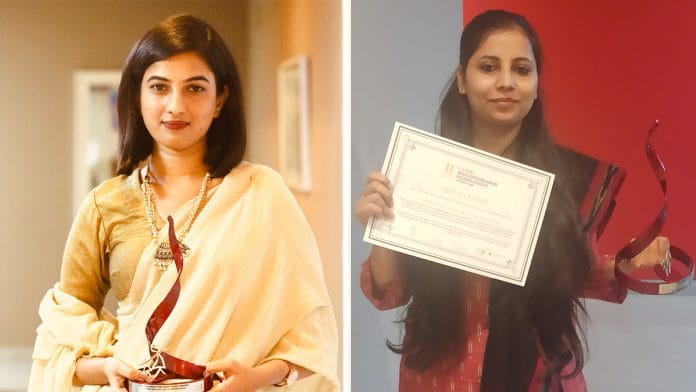New Delhi: ThePrint journalists Jyoti Yadav and Heena Fatima have won the 11th edition of The Laadli Media Awards supported by the United Nations Population Fund (UNFPA), for their reports in the category of Gender Sensitivity (Regional) 2019-2020.
The awards were formally announced at a function held online on 19 November, 5.30 pm.
The chief guest for this year’s award was Faye D’Souza, an independent journalist, while the guest of honour was Sriram Haridass, Country Representative of UNFPA India.
This is the second year in a row that journalists of ThePrint have been chosen for this award. Fatima won the award for her report ‘Mahila Virodhi Hain Online Shiksha (Online Education is Anti-Woman)’ published by Feminism In India — a digital media organisation.
This is the second year in a row that Yadav has won the award. This year, she won the award for her story — ‘Locker room boys to IT cell men: India’s rape culture grows with shame or consequences‘. She also received two ‘Jury Appreciation Citations’ for her stories ‘Kaise ek mahila adhikari ne ek saal se toilet mein band 38 varshiya Ramrati ko kiya rescue (How a female officer saved 38-year-old Ramrati, who was locked up in a toilet for over a year’ and ‘Gramin bharat: Ghungat ke bheetar se kaisi dikhti hai digital duniya (How the digital world looks from inside a veil)’.
Fatima Khan, who was with ThePrint at the time, had also won the award last year for her coverage of the alleged rape and murder of a 23-year-old woman, who was burnt alive in Uttar Pradesh’s Unnao district in December 2019, under the category of web news report.
The report, with the headline ‘They said no one should cry, but then broke down — how Unnao village mourned rape victim’, was a deep dive into the crime and also explored the caste, gender and political dynamics of the village that played an instrumental role in the events leading up to the tragedy.
Bringing stories of the marginalised to the fore
Last year, Yadav had won the award for her web feature, ‘Hariyanvi Mardon ke ehsan tale dabi auratein jin ki apni pehchan kho gayi’.
“This year, my opinion piece on Rape Culture has won this award. For someone who was born and brought up in a village in Haryana and could only observe gram Panchayat meetings through closed gates, I truly feel empowered to contribute to the public discourse as a 21st century reporter,” she said.
Heena Fatima’s report explores how education has become inaccessible for women with online education taking over during Covid times.
“Today we see how the political discourse is affecting journalists and the principles of journalism are being misaligned. So it is important in today’s time that the issues of the who are marginalised, poor, Dalits, tribals, minorities, and women are made a part of mainstream media, and through ground reporting, their truths are brought to the masses,” Heena Fatima said.
“This is the journalist’s work and we should do ground reporting and consistently work to bring forth people’s issues and keep the principles of journalism alive,” she added.
Also read: Awareness camps, machines, inspection — how Haryana’s Ambala cut farm fires by 80% in a year






